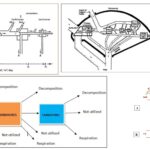O Level Biology 23 Views 1 Answers
Sourav PanLv 9November 3, 2024
Explain that cancers form as a result of uncontrolled cell division
Explain that cancers form as a result of uncontrolled cell division
Please login to save the post
Please login to submit an answer.
Sourav PanLv 9May 15, 2025
Cancers form as a result of uncontrolled cell division, which occurs when the normal regulatory mechanisms governing the cell cycle fail. Here’s an explanation of how this process leads to cancer:
Mechanisms of Uncontrolled Cell Division
- Cell Cycle Regulation:
- In healthy cells, the cell cycle is tightly regulated by a series of checkpoints and signaling pathways that ensure proper division and prevent excessive growth. These regulatory mechanisms involve proteins that act as signals to either promote or inhibit cell division.
- Mutations and Genetic Changes:
- Cancer often arises due to mutations in genes that control cell division. These mutations can occur spontaneously during DNA replication or be induced by environmental factors such as radiation, chemicals, or viruses. Over time, the accumulation of mutations can disrupt the normal function of these regulatory genes.
- Key types of genes involved include:
- Oncogenes: Mutated forms of normal genes (proto-oncogenes) that promote cell division. When these genes are activated, they can lead to increased proliferation.
- Tumor Suppressor Genes: Genes that normally inhibit cell division or promote apoptosis (programmed cell death). Mutations that inactivate these genes remove critical controls on the cell cycle.
- Failure of Checkpoints:
- The failure of cell cycle checkpoints allows cells with damaged DNA to continue dividing instead of being halted for repair or eliminated through apoptosis. This unchecked proliferation leads to the formation of a mass of cells, known as a tumor.
Tumor Formation
- Benign vs. Malignant Tumors:
- Tumors can be classified as benign (non-cancerous) or malignant (cancerous). Benign tumors grow slowly and do not invade surrounding tissues or spread to other parts of the body. In contrast, malignant tumors exhibit uncontrolled growth, invade nearby tissues, and have the potential to metastasize (spread) through the bloodstream or lymphatic system.
Consequences of Uncontrolled Division
- As cancer cells continue to divide uncontrollably, they can disrupt normal tissue function and lead to serious health issues. The accumulation of cancerous cells can interfere with organ function and ultimately result in life-threatening conditions if not treated.
0
0 likes
- Share on Facebook
- Share on Twitter
- Share on LinkedIn
0 found this helpful out of 0 votes
Helpful: 0%
Helpful: 0%
Was this page helpful?




